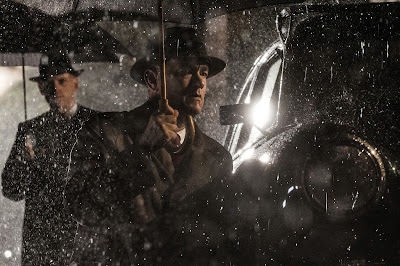Whatever imagery the title Bridge of Spies conjures in your mind are likely a heck of a lot more thrilling than what appears in Steven Spielberg's latest film, a studious spy tale that's about as far from thrilling as it gets. Still, this is a Spielberg movie we're talking about here, and there's plenty to like: it's an insightful, noir-tinged, captivating recreation of a historical event I hadn't heard about before. I never thought I'd describe one of Spielberg's movies as "educational," apart from maybe just a pure filmmaking perspective, but here we are.
Bridge of Spies
Director: Steven Spielberg
Starring: Tom Hanks, Mark Rylance, Austin Stowell
It's the height of the Cold War. Tom Hanks plays James Donovan, a Brooklyn lawyer unanimously chosen to give suspected Soviet spy Rudolf Abel (Mark Rylance) a good defense when his case goes to trail. However, the country's court of public opinion — which includes the judge and Donovan's own wife (Amy Ryan) — has already come to its verdict: Abel should be hanged for his crimes. But Donovan, a Spielbergian hero who refuses to back down in the face of overwhelming dissent, convinces the judge to sentence Abel to jail time in case one of America's soldiers is shot down behind enemy lines; if that happens, he argues, the government will have the option to trade prisoners. Of course that's exactly what happens, and Donovan — working with the CIA but not technically a government employee, as to avoid culpability if anything goes wrong — ends up traveling to Berlin in order to negotiate the exchange personally, going rogue in an effort to also secure the life of a captured American student.
Hanks, in his fourth time starring for Spielberg, does typically strong work as Donovan, proving yet again that he's this generation's Jimmy Stewart. In fact, the director's classical filmmaking makes the whole movie feel like it's from another time, like it would have fit right in with some films of the 1960s. Some of the writing (from scribes Matt Chapman and the Coen Brothers), with its repetition of jokes and obvious depiction of themes, feels like a throwback to an earlier era of film history, and the movie's gee-whiz idealism hearkens back to something Frank Capra might have made. Spielberg is certainly no stranger to this kind of film, and while I much prefer him doing bombastic action adventures or science fiction yarns, this feels much more in line with something like 2012's Lincoln: a relatively small scale character piece about a man who has to make tough decisions in order to stand up for what's right.
The movie starts out great, with a gripping opening scene as the FBI tracks Abel and tries to catch him in the act of espionage. Rylance's performance is one of the film's highlights, and his perpetually raised eyebrows, calm demeanor, and quiet charm immediately endear him to the audience. It's a perfect piece of casting, and the fact that the audience likes this man plays very much into Spielberg's desire to paint the two superpowers of the Cold War as being more similar than they imagine. There's some editing and cross-cutting that makes that thematic connection perhaps a bit more explicit than necessary, but this is not a subtle film: it wears its heart on its sleeve, and Thomas Newman's score is so on-the-nose it may as well be a pair of well-worn glasses. The first chunk of the story, which covers Abel's trial and the vilification of Donovan in the public, contains the main thrust of the film's overall message, drawing parallels to our post-9/11 treatment of captives in Guantanamo Bay and allusions to Edward Snowden's Earth-shattering reveal about our own government's spy practices.
But most of the story follows Donovan managing the tricky details of the prisoner exchange in Berlin's back rooms, and though the finale is satisfying enough, the pacing slows to a snail's pace as he goes back and forth from one side to the other, relaying information he's just learned and trying to figure out the next step. This is very much a film comprised of people sitting around talking, and while I found the true-life story compelling, the movie's draggy middle took the wind out of its sails for me a little. A short sequence of an American plane being shot down and the square-jawed pilot's (Austin Stowell) narrow escape is the only explosive moment in the movie's 135 minute run time. The rest is a pretty straightforward discourse about who's trading who for whom, where the prisoners need to be at what time, etc. It's a scaled down exploration of morality that likely won't top anyone's list of favorite Spielberg movies, but it's hard to complain when what will surely go down as one of The Beard's most average films is as good as this.




5 comments:
I found LINCOLN pretty educational. And consequently, boring. I haven't seen BRIDGE yet, but when I do, I'll try to comment more about it.
-Jacob
I suppose that's true!
I liked BRIDGE for the most part. I didn't find it boring; to me it was a totally immersive experience, and I did not find the deliberate pacing dull. My big problem with the movie is that at the end Spielberg dumbs down the political stuff, siding with a kind of gooey, oversimplified Americanism: Communists bad, Americans good. But I also was glad to be in the hands of a cinematic pro, even if the politics were muddled.
Agreed on all accounts. When there's so much garbage to sift through every year, it's nice to sit back and enjoy a new Spielberg movie occasionally.
Although lately, I have wondered if my gratitude for those rare well-made, more grown-up movies has turned into a kind of grade inflation. "Wait...no explosions? Yes! You get an A!"